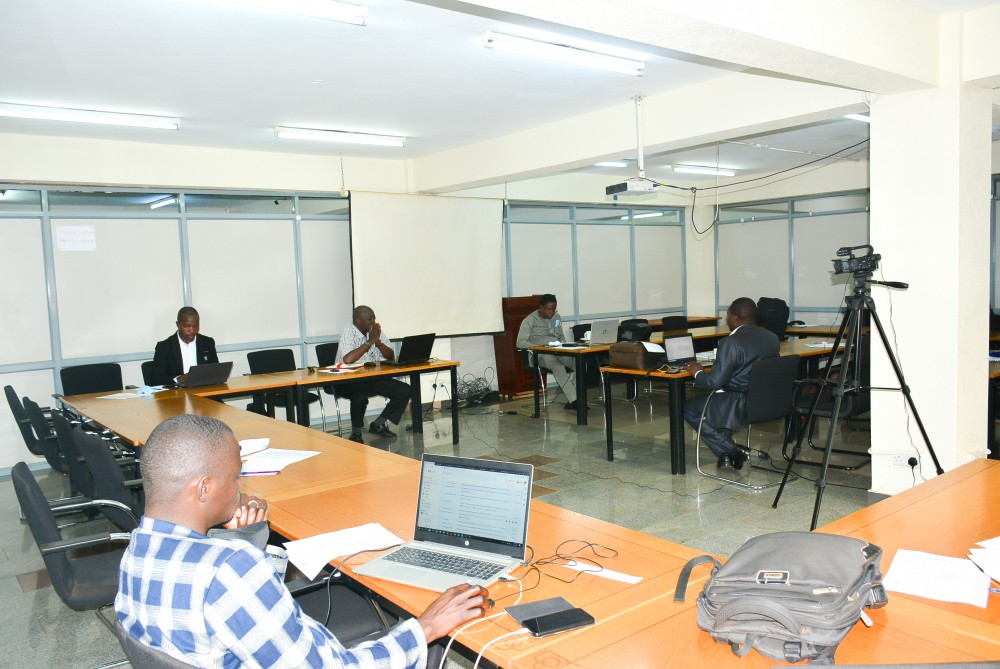
Apr
Basoga Nseete Students Association Prepares for Vibrant Handover Ceremony with Diverse Cultural Showcase
April 25, 2024, 4:58 pm
 Rebecca Nabejja
Rebecca Nabejja

KIU, Main Campus – On 11th May 2021, Kampala International University set out to hold strategic meetings of the KIU ISP strategic implementation committee and members of the council committee of research at the university.
The meetings, which took place on blended mode (both physical and virtual attendance), were held to review all the various research documents approved by senate and council of KIU, and the CIRCLE ISP good practice guide.
The meetings were chaired by the Deputy Vice-Chancellor – Research, Innovations, Extensions, & Consultancy (DVC-RICE), Prof. Chukwuemeka Diji, and was attended by the council research committee, academic deans and principals, research deans, and deputy directors (RICE).
The targeted outcome was to achieve a common understanding of the implementation process of the ISP implementation fund, and the alignment of KIU research activity to include the CIRCLE ISP good practice guide, basing on the framework and report guide for the preparation of the five-year Research Development Framework for KIU for the period 2021 – 2026.
The research cluster of law, good governance and inequalities, in the schools/colleges of SOL, CEM, CHSS, SOMAC, and SAHS, had their research focus on social protection systems; poverty and disability; human rights; infrastructure development, discriminatory laws, practices, and policies; social and urban development; law reforms and development; role of good governance in service delivery; the impact of good governance on development; good governance practices; good governance and conflict management; digital health and good governance; freedom of information; whistle blowing for reward; asylum support systems; etc.
The research cluster of education, gender, social management and inclusive development, in the schools/colleges of CEM, COEDEL, CHSS, FEM, FBM and SOMAC, had their research focus on quality educational services; urban systems and public policy; violence against women and girls; equal opportunities through the application of technology; ICT and women empowerment; land and property rights; enforceable legislation for the promotion of gender equality; technical, vocational, and university education; disaster and disaster management; social and economic impacts of industrial production activities; research into how access to and allocation of basic resources is organized; social dimension of economic growth and development.
The research cluster of energy, environment and climate change, in the schools/colleges of SEAS, FST, CEM, and SOMAC, had their research focus on energy development; water management and practices; climate change and development; environmental management and practices; sustainable production and consumption; renewable energy research and development; water-food-energy nexus; etc.
The research cluster of science, technology and innovation management in the schools/colleges of SOL, SEAS, SOMAC, FST, and FBMS, had their research focus on STI policies programmes; use of data science for development; equipment maintenance and manufacture; intellectual property rights; innovation management and practices; development of new products and services; new and emerging technologies; innovation policy and development; digital technologies; traditional, local, and indigenous knowledge; regulatory framework for science and technology; start-up technologies; etc.
The research cluster of public health, infectious and re-emerging diseases in the schools/colleges of FCMBS, FABS, FBS, SOP, SEAS, SON, and SOMAC had their research focus on disease control; health disparities; housing and communities, innovative drug development and practices; herbal medicine; epidemiology of microbial diseases; pathogenic microorganisms; zoonotic disease; mental health; health and racial inequalities; vaccines; climate change and health; water and sanitization; HIV/AIDS; multi-drug resistant tuberculosis; fungal infections; malaria and other tropical diseases; etc.
The research cluster of health system, sustainable livelihoods and non-communicable diseases, in the schools/colleges of SOP, SAHS, FCMBS, CHSS, COEDEL, SEAS, and SOMAC had their research focus on health services and systems; healthy lifestyles; maternal health research; maternal mortality; breast cancer risks; women cardiac disease in pregnancy; diabetes; depression; health informatics; mental and behavioral health conditions; health system research and administration; cardiovascular diseases; life events and depression symptoms; the impact of community health worker programmes; socioeconomic inequalities and children health; drug abuse; drug and diagnosis development studies; opportunistic infections; disease prevention and control; oral health and hygiene; etc.
The research cluster of entrepreneurship, employability and skill development in the schools/colleges of CEM, CHSS, COEDEL, SOMAC, FB, and SOL, had their research focus on entrepreneurial development and employment creation, small and medium scale enterprises (SME); marketing skills; skill acquisition and entrepreneurial development; developing entrepreneurial skills; business and new employment levels; public policy and gainful employment; labor practices in the public and private sectors; entrepreneurial training and performance; entrepreneurial development in Uganda; youth employment and entrepreneurial skill development; skill development; employability and entrepreneurial; market orientation and entrepreneurship; promoting entrepreneurial ideas.
Kampala International University,
Box 20000, Ggaba Road, Kansanga, Kampala